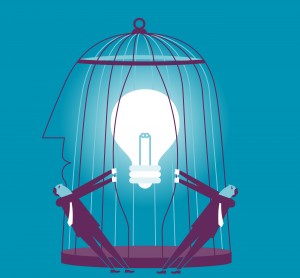Should higher education be free? Can students learn without the direct assistance of faculty? What’s the most effective model of assessment?
These kinds of questions are central to innovation in higher education, a topic in the news this week with the announcement of a new higher education innovation program at Arizona State University and Georgetown University.
Set to launch this fall, the ”Institute for Innovation in Higher Education Leadership” aims to bring higher education executives together to think strategically about higher education.
Inside Higher Ed covers the story in full, pointing out that while this may be territory already covered by the Harvard Graduate School of Education, the American Council on Education, and several trade associations, “the ASU-Georgetown program is for a variety of college leaders, including executives, trustees and others who aspire to lead in higher ed.”
Innovation On the Brain
But this new innovation center isn’t coming out of the blue. Tapping innovation - or at least paying attention to the latest innovative ideas - has remained on the forefront of an educational leader’s minds with the rise of MOOCs, mobile, and trends in competency-based education, to name a few.
The recent 2014 SXSWedu Conference covered a wide range of ‘future-impact’ ground – competency–based education; gamification; online learning, MOOCs, and business models; assessment; and cognitive science. Here are 4 takeaways from the powerhouse gathering.
One of Northeastern’s SXSWedu Conference presenters, Northeastern’s Kevin Bell, has written about innovative ways to change traditional forms of student assessment in a piece called, “Death to the College Credit.”
And John LaBrie, dean of Northeastern University’s College of Professional Studies, has written about a number of ways to move the dial, including the design of online experiential curricula.
“We cannot behave in a business-as-usual way if we are to prepare our students to be job-ready on day one,” he writes.
But others, like Peter Stokes, vice president for Global Strategy and Business Development for Northeastern University, suspect that innovation is “just another word for anxiety.”
“Maybe all of this talk about innovation is, in part, an effort to domesticate and tame challenging and threatening questions,” he writes.
What do you think? Is innovation the means to change higher education for the better? Or does it challenge the status quo? Share your thoughts.




